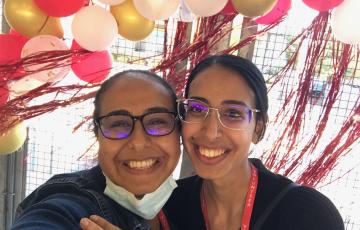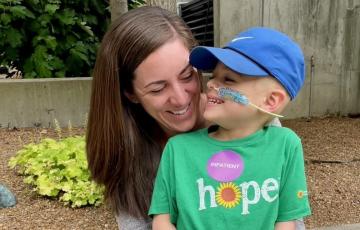Search Results

Shaden
Shaden is fighting against leukemia. He is three years old and was a healthy boy before his diagnosis. Then, out of nowhere, he would get a lot of body aches that were very unusual.
Sometimes Shaden didn’t feel like being the happy, energetic kid he always was. He wouldn’t walk, sleep or eat. We decided to take Shaden to the children’s hospital and they did some testing. They soon told us that he might have leukemia. They did more testing, and Shaden was diagnosed with acute myeloid leukemia (AML).
Diagnosis
An accurate diagnosis of the type of leukemia is important. The exact diagnosis helps the doctor estimate how the disease will progress and determine the appropriate treatment.
Diagnosing acute myeloid leukemia (AML) and the AML subtype usually involves a series of tests. Some of these tests may be repeated during and after therapy to measure the effects of treatment.
Side Effects
Cancer therapy for chronic myelomonocytic leukemia (CMML) can sometimes produce side effects. For most patients, treatment side effects are temporary and go away once therapy ends. For other patients, side effects can be more severe, sometimes requiring hospitalization. Some patients never have any side effects.
Before you undergo treatment, talk with your doctor about potential side effects. Drugs and other therapies can prevent or manage many side effects.

Dani
My daughter was a professional dancer out on tour when she was diagnosed with acute lymphoblastic leukemia (ALL). She was 25 years old dancing in Detroit, Michigan, at the time, feeling short of breath and having night sweats. Being a dancer, you are in the best shape of your life, and you know when something is going on with your body. So as a mom not knowing what was wrong, I started to panic and told her to start at the urgent care. Two days later I was on a plane heading to Detroit where they told her they thought she had leukemia.

Todd
This cause is dear to me because my grandmother, Anne Zavorskas, passed away several years ago from Hodgkin’s disease--a form of leukemia. Also, many years ago, my mentor’s son, Ryan Hurley, had a recurrence of leukemia, which he was first diagnosed with at the age of three. He died at the age of 19. Unfortunately, leukemia at the time caused more deaths than any other cancer in children under the age of 20. These instances led me to my desire to donate time and money to this particular charity. I have volunteered my time and fundraising expertise ever since.

Saly & Merna
We began volunteering with The Leukemia & Lymphoma Society’s (LLS) annual Light The Night (LTN) event in high school. Our hearts were touched by the courage and stories of empowerment present at the event, so we came back the following year, and then the year after that, and so on. Even through COVID, we were supporters of the event and the individuals and families there. We volunteer every year and support LLS as we learn more about friends who are wrestling with and have been impacted by leukemia and lymphoma, always praying for healing and restoration.
Treatment
The main treatment for ALL is chemotherapy given in phases. Most treatment regimens take 2 to 3 years to complete.
Not every child with ALL receives the same treatment. Your child’s doctor will tailor your child’s treatment based on the ALL subtype and other factors, such as age, health and how the cancer responds to treatment.
Your child’s treatment may also include:
Treatment
It's important that your doctor is experienced in treating patients with acute leukemia or has access to an acute lymphoblastic leukemia (ALL) specialist.
Types of ALL TreatmentDoctors use several types of approaches and treatment combinations for ALL:
Diagnosis
Diagnosing hairy cell leukemia usually involves a series of tests, including blood tests and bone marrow tests.
Treatment Outcomes
The cure rates and survival outcomes for patients with ALL have improved over the past few decades. Today, nearly 90 percent of adults diagnosed with ALL achieve a complete remission, which means that leukemia cells can no longer be seen in the bone marrow with a microscope. Still, despite high remission rates, relapses still commonly occur in adults and survival rates for adult patients remain at approximately 20 to 40 percent. However, these rates can vary significantly, depending on the patient’s ALL subtype and other prognostic factors.
Splenectomy
A splenectomy is the procedure done to remove the spleen. Before effective drugs became available for hairy cell leukemia, splenectomy was the first-line treatment for the disease.
Follow-Up Care
Click here for information about follow-up care, including what to expect, long-term and late effects of treatment, survivorship clinics, and other resources such as The National Comprehensive Cancer Network (NCCN) treatment guidelines.
Related Links- Download or order The Leukemia & Lymphoma Society's factsheet Hairy Cell Leukemia

Madison
Hello! My name is Madison, but that's not what you need to remember. The name you need to remember is Brodie. You see, I am joining the 2023 Student Visionaries of the Year campaign in honor of my childhood friend, Brodie. In November 2018, Brodie was diagnosed with acute myeloid leukemia (AML) while only in the 6th grade. With a short fight of a long, five months, Brodie gained his wings on April 9, 2019. But today the war wages, on and we are battling this together. Our war is against leukemia, and I have no doubt we are going to win.
Mabel
My name is Mabel. I was diagnosed with acute myeloid leukemia (AML) in December 2018. I started aggressive treatment at Northside Hospital in Atlanta, GA. The Leukemia & Lymphoma Society (LLS) became my safety net emotionally and financially. Emotionally they were very present and readily available to answer any questions or concerns I had. Financially they helped me cover the costs of my private medical insurance premiums, co-pays, and co-insurance for medication, labs, and tests. I am forever thankful to the LLS because they are able to help people like me.
Side Effects
Most ALL treatment side effects are temporary and subside once the body adjusts to therapy or after the therapy is completed. If side effects become severe, children may need to be hospitalized.
Side effects common to ALL and its treatment include:
Side Effects
Cancer therapy for juvenile myelomonocytic leukemia (JMML) can sometimes produce side effects. For most patients, treatment side effects are temporary and go away once therapy ends. For others, side effects can be more severe, sometimes requiring hospitalization. Some patients never have side effects.
Before your child undergoes treatment, talk with his or her doctor about potential side effects. Drugs and other therapies can prevent or manage many side effects.
Reduced-Intensity Allogeneic Stem Cell Transplantation
Reduced-intensity allogeneic stem cell transplantation (sometimes called mini-transplant or nonmyeloablative transplant), like a standard allogeneic stem cell transplantation, uses stem cells from a donor, but the conditioning treatment contains lower, less toxic doses of chemotherapy and radiation. This type of SCT may be an option for certain patients who are older or who are otherwise not healthy enough or strong enough to undergo standard allogeneic SCT.
Follow-Up Care
Click here for information about follow-up care, including what to expect, long-term and late effects of treatment, survivorship clinics, and other resources such as The National Comprehensive Cancer Network (NCCN) treatment guidelines.
Parents of JMML patients are advised to discuss survival information with their child's doctor. The treatment of JMML patients hasn't led to long-lasting remissions in most cases. However, individual factors influence patient outcomes. See Treatment Outcomes.
Watch and Wait
A small percentage of people can manage their hairy cell leukemia with their doctors using a watch-and-wait approach. By using the watch-and-wait method, your doctor can monitor your condition with regular physical exams and lab tests. You won't take any drugs or undergo any treatment during this period.
You may feel uncomfortable because you know that you have cancer, yet you're not being treated right away. Rest assured that the watch-and-wait approach lets you avoid therapy's side effects until you need treatment.

Phil
My sweet and wild 3-year-old son, Phil, was diagnosed with B-cell acute lymphoblastic leukemia (B-ALL) in the midst of the holidays in 2019 on December 27. Phil began treatment right away, following a 2½-year treatment protocol for his leukemia type and risk level. With every hospital visit, chemotherapy infusion, medication to take, procedures in the OR, or “job” he was told to do, Phil smiled, he laughed, and he cooperated (with a little encouragement and bribery of course!). There really was something so special about him.

Sara
My name is Sara, and I am an acute lymphoblastic leukemia (ALL) survivor! I was diagnosed with ALL suddenly in November 2023 at 31 years old. I was feeling off a few months before my diagnosis, but I thought I was overdoing it at the gym, not eating well enough, not stretching enough, and not drinking enough water. Even my ribs were hurting to the point where drinking water was painful, but I thought I still did too much at the gym.

Oakley
Oakley was a typical 2-year-old going to gymnastics and play dates with her friends until a week after her third birthday when she began to decline health-wise very quickly. Oakley’s eyes began to swell, alternating between both eyes. We went to one urgent care visit, two ER visits, a visit with her primary pediatrician, and two blood draws before she was diagnosed with acute lymphoblastic leukemia (ALL).

Kessler
Kessler McLaughlin’s life change forever on July 13, 2006. In the months leading up to that day, he was a typical 14-year-old kid, except that he was in pain all the time. Doctors couldn’t figure out why his joints were in so much pain.

Rohan
I am an acute myeloid leukemia (AML) survivor. I am now 10 months post-transplant and feeling stronger every day.I was born and raised in the Bay Area to South African Indian parents. I hold degrees from UC Berkeley and USC. I have built my career around advocating for equity in tech and marketing services that uplift underrepresented communities.

Carlos
I was diagnosed with acute myeloid leukemia (AML) in June 2021 in Puerto Rico. I was introduced by a hospital social worker to The Leukemia & Lymphoma Society (LLS) for educational resources for patients and caregivers. My stem cell transplant was performed at Auxilio Mutuo Hospital in 2022. After applying for financial help from the LLS, I received help from several programs. LLS provided valuable educational materials that helped me to understand the condition and to make informed decisions. I am now 19 months post-transplant and in remission.